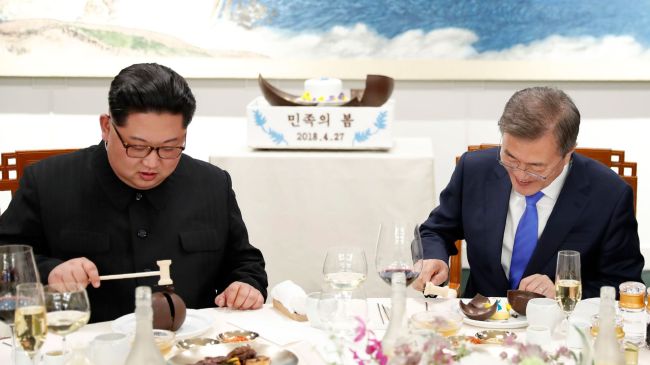A new type of “gold rush” of sorts is unfolding, as the latest detente with North Korea grabs the imagination of enterprising South Koreans eyeing fresh opportunities in the North.
The South Korean government, for one, is looking for the right moment to revive old business ties and form new ones with its communist neighbor rich in untapped natural resources.
There are signs that South Korea is seeking to revive the import of sand from the North. The Ministry of Oceans and Fisheries recently raised the idea of importing sand from the North’s western coastal city of Haeju, South Hwanghae Province, to mitigate a shortage of sand used in construction. The ministry’s ban on the excavation of sand within the Exclusive Economic Zone has led to the scarcity of sand, driving up costs of construction materials.
The cross-border sand trade was in fact one of the longest-running inter-Korean economic projects, halted when tensions mounted over North Korea’s sinking of a South Korea warship in 2010. The shipments had begun in 2002, during a period of rapprochement that followed the first inter-Korean summit in 2000.
In addition to its vast mineral reserves, including coal, magnesite, steel, zinc, limestone and anthracite, North Korea’s unique products that reflect its culture and history have caught the attention of South Korean provincial and local governments.
Gyeonggi Province appears eager to host the first South Korean branch of Okryugwan -- a Pyongyang restaurant that specializes in North Korean-style traditional cold noodles. Last week the mayor of Paju, near the inter-Korean border in Gyeonggi Province, asked for the provincial government’s assistance in opening up an Okryugwan branch in the city.
Last month, Gyeonggi Province Vice Governor for Peace Lee Hwa-young said that North Korea had agreed to cooperate in the project during his visit to the North on Oct. 4-6 to participate in a cross-border event celebrating the 11th anniversary of the 2007 inter-Korean summit.
If Okryugwan does open in Gyeonggi Province, it is expected to grow fast as both a popular local hot spot and international tourist attraction on the back of its main dish, famed for having been served to all South Korean presidents visiting Pyongyang. During the first summit between South Korean President Moon Jae-in and North Korean leader Kim Jong-un in Panmunjom, Okryugwan naengmyeon was served by a team from the restaurant who brought a noodle-making machine from Pyongyang for the occasion.
Lee raised the possibility that the South Korean branch of the famous cold noodle restaurant could also serve as a venue for the meeting of families separated by the 1950-53 Korean War.
Meanwhile, the city of Suwon, just south of Seoul, is looking to integrate North Korea’s Taedonggang beer with South Korea’s drinking culture of “chimaek” that pairs fried chicken and beer. Suwon, which boasts a street dedicated to its fried chicken, plans to hold a peace festival featuring its chicken alongside North Korean beer.
Taedonggang beer shot to the international limelight when a British journalist praised its flavor.
A South Korean civic group called the Association for Asia Pacific Peace Exchange recently obtained distribution rights for Taedonggang beer and an agreement was reached with the National Reconciliation Council, a North Korean body, according to local reports. However, the group has yet to gain official permission for distribution rights from the Seoul government.
There is no dearth of events co-organized by central and provincial governments and North Korea.
A South Korean civic organization headed by former President Kim Dae-jung’s youngest son held a joint event with its North Korean counterpart on the North’s eastern slopes of Kumgangsan on Nov. 3 and 4 celebrating the 20th anniversary of the Korean Council for Reconciliation and Cooperation. It marked their first joint event in a decade. KCRC chief Kim Hong-gul and lawmakers from the ruling Democratic Party of Korea joined the event.
On a larger scale, a celebration for the 11th anniversary of the 2007 inter-Korean summit was held Oct. 4-5 in Pyongyang with Unification Minister Cho Myoung-gyon, North Korea‘s nominal head of state Kim Yong-nam and head of the Reunification Committee of the Country Ri Son-gwon in attendance.
Gyeonggi Province is looking to carry on momentum from the PyeongChang Games earlier this year, as it seeks additional sports exchanges with North Korea. It recently announced plans to host a marathon starting in Paju, Gyeonggi Province, and ending in the North’s border town of Kaesong.
Meanwhile, Gangwon Province, site of the Winter Games, has been focusing on promoting cross-border exchanges between youth soccer teams. An inter-Korean youth soccer tournament was held in the North’s capital Pyongyang in August and a reciprocal game was held Oct. 31 in Gangwon Province.
Despite the rush to engage with North Korea, there is also strong skepticism that the projects will make any dramatic progress with layers of international sanctions on North Korea still intact.
The US Treasury Department last month emailed several major South Korean banks requesting compliance with sanctions on North Korea, which has been interpreted as a thinly veiled warning against progress in inter-Korean ties that are not in sync with denuclearization talks between Washington and Pyongyang.
Pyongyang has sought to win sanctions relief in exchange for efforts it has already made in denuclearization, but the US maintains there will be no sanctions relief until Pyongyang has taken more credible, irreversible steps toward denuclearization.
By Jung Min-kyung (
mkjung@heraldcorp.com)








